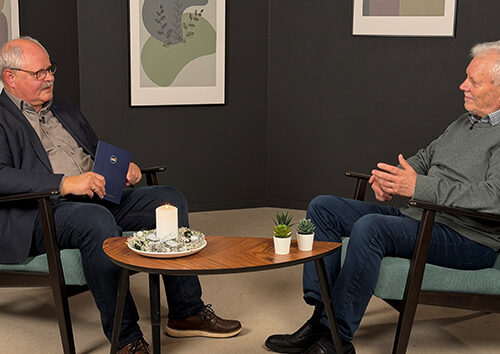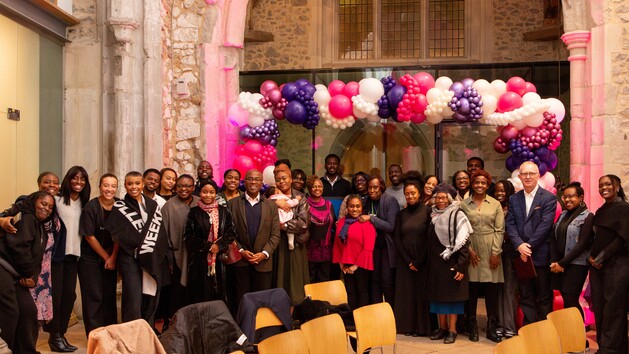17 October 2017 | Binfield, UK [Helen Pearson] Love it or hate it we can’t avoid it. We are all involved in politics. In celebrating 500 years of Reformation history, organisers of the 2017 Beach Lecture, selected Dr Alec Ryrie, Professor of the History of Christianity at the University of Durham, to offer supporters of the Newbold Diversity Centre a rare opportunity to understand the political roots of their faith and their world.
Professor Ryrie, a leading historian of Protestantism, explored the story of political responses to the Lutheran event and the many Protestant movements it spawned. His lecture, presented on Tuesday, 10 October, focused on an exploration of the nature and roots of Protestant ‘apoliticism’.
Ryrie began with two familiar stories about Protestants and politics. The first is a story of Protestant defiance and revolution. It tells of how Protestants in the 16th and 17th centuries involved themselves in a series of conflicts against tyrannical rulers and, at most extreme, justified regicide in the name of the egalitarian kingdom of Christ. In the 20th century, Protestantism animated a series of political responses in Korea, in Germany under the 3rd Reich and in anti-apartheid South Africa. ‘This is a celebratory story which allows Protestants to feel good about themselves,’ he stated.
But there is an alternative story, told mainly by Protestant detractors, who also point to authoritarian excesses from people like Oliver Cromwell, the New England Puritans, and the Dutch Reformed Church in South Africa. The most vivid expression of this story was the deep involvement of German Protestants in legitimising and enabling the Nazi regime out of what has been described as a ‘fatal humility before the secular power’.
So, Professor Ryrie pointed out, we can have Protestant heroes or Protestant villains if we choose. He argued that while there is truth in each of these stories, there is a third approach which does greater justice to the nature of Protestantism and the way it shapes our modern world.
This third story grows out of the essential nature of Protestantism. This, he claimed, is not about politics, but ‘about God and…human salvation’. Such a story reveals what Professor Ryrie called, the ‘hidden strand of Protestant apoliticism’, a stance rooted in Luther and echoing the apostle Paul who both seemed to see government as something of a necessary evil. They taught that Christian hearts should rather ‘be set on the kingdom of Christ where there is no law and no coercion and which is not passing away.’ Ryrie gave examples of Protestants with this view, who appeared to be fighting for secular freedom, but then amaze their secular ‘allies’ by swerving out of line and placing their emphasis on freedom in the Spirit, appearing to be ‘willing to tolerate a worldly evil to save souls.’
Professor Ryrie went on to explore this ‘apoliticism’ and the refusal made by many evangelical groups – Seventh-day Adventists, Methodists, and Pentecostals in the West, and other lesser known groups in Korea and South America, to become involved in secular politics. In some cases, ‘apolitical withdrawal’ has been seen as ‘collaboration’ with various right-wing groups. From a particular perspective, their response looks like deeply irresponsible moral failure.
 But is Protestant apoliticism merely cowardly submission? Or is it something more profound? It may seem true that many governments can ‘buy apolitical Protestants’ loyalty very cheaply’, but this is not true of all. A large majority of avowedly apolitical Chinese Christians have refused to join the government’s Three-Self Patriotic movement arguing that it implicates them unwillingly in political life. The leader of another apolitical group, the German Confessing Church, spent eight years in a concentration camp. The church had offered little resistance to the Nazi regime, but defended its own freedom to decide its own doctrine, worship and polity. These were no cowards.
But is Protestant apoliticism merely cowardly submission? Or is it something more profound? It may seem true that many governments can ‘buy apolitical Protestants’ loyalty very cheaply’, but this is not true of all. A large majority of avowedly apolitical Chinese Christians have refused to join the government’s Three-Self Patriotic movement arguing that it implicates them unwillingly in political life. The leader of another apolitical group, the German Confessing Church, spent eight years in a concentration camp. The church had offered little resistance to the Nazi regime, but defended its own freedom to decide its own doctrine, worship and polity. These were no cowards.
After this global exploration, Dr Ryrie concluded that totalitarianism becomes the enemy of apolitical Protestantism only when authoritarian governments are unwilling to leave it alone to be apolitical. In more recent years, there have been more right-wing authoritarians ready to do so, but that does not necessarily make apolitical Protestants friends of right-wing authoritarianism. There is a corresponding affinity between Protestantism and the modern centre-left in a shared emphasis on equality and a suspicion of nationalism.
Professor Ryrie concluded his lecture with studies of different attitudes to apoliticism, first in Latin America, and then in apartheid-era South Africa. In both cases, he explored the subtle differences between those more political groups who were willing to defy evil with political weapons and the ‘apolitical’ churches teaching their adherents to defeat evil by personal, local and domestic means.
Finally, Professor Ryrie described the benefits of ‘the unfashionable gospel of apoliticism’. It offers a useful counterbalance to a contemporary culture which reads everything through a political prism. A ‘heavenward focus’, he claimed, could be the means of encouraging individuals of irreproachable ethics to campaign against corruption. Moral renewal in political life has happened before and ‘it is not impossible, just difficult.’ The second contribution which Protestant apoliticism offers is the reminder that the ‘salvation’ offered by the gospel of politics is strictly limited. After its first 500 years, ‘Protestantism may just discover that the time for a gospel which offers inner renewal and empowerment in the very midst of everyday life has come.’
A lengthy Q&A session followed where Justin Welby and Luther, Wycliffe and Donald Trump all figured. Professor Ryrie responded to questions about the doubtful future of ecumenism, the historic churches vs the growth of Pentecostal churches and the tensions between the religious right and republican politics. He questioned contemporary assumptions about the efficacy of politics and celebrated the power of prayer and collective community action. [tedNEWS]
tedNEWS Staff: Victor Hulbert, editor; Deana Stojkovic, associate editor
119 St Peter’s Street, St Albans, Herts, AL1 3EY, England
E-mail: [email protected]
Website: www.ted.adventist.org
tedNEWS is an information bulletin issued by the communication department of the Seventh-day Adventist Church in the Trans-European Division.



